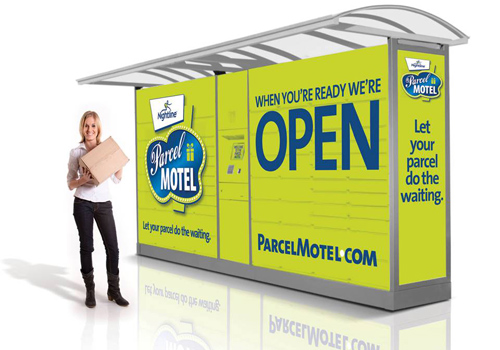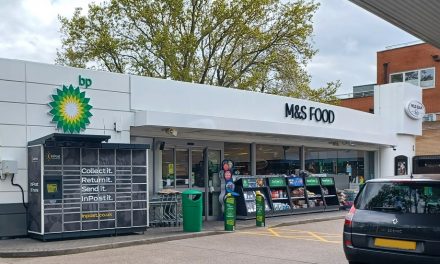
Parcel terminals: Threat or opportunity for delivery companies?
Ahead of next month’s launch of a parcel terminal network in Ireland, John Tuohy, chief executive of parcel carrier Nightline, discusses the issue of who controls the final mile in the e-commerce chain. During the last three months, I have turned the pages on my office calendar with particular relish.
Back in March, you may recall, Nightline announced its decision to launch a network of self-service parcel terminals across Ireland.
The first of our 100 distinctively-branded ‘Parcel Motel’ units earmarked for the greater Dublin area go ‘live’ next month and we’re hoping to have a further 300 nationwide by the end of 2014.
Even before we disclosed the start of our project, all those involved had immersed themselves in the language of locker boxes. Since, we have watched with interest as the concept has taken hold around the globe.
Delivery firms and state postal operators on almost every continent have rushed to adopt their own version.
One reason is that companies investing in such technology have been able to demonstrate a genuine commitment to making online shopping cheaper and more convenient for consumers and retailers alike.
It makes more e-commerce possible as well as reducing the cost and potential complications associated with handling ever-growing parcel volumes.
The exhaustive market research which we have undertaken bears out that consumers love the idea of being able to collect deliveries at a time and place of their choosing rather than having to organise their day in order to wait at home for a knock on the door from a courier or arranging to pick up a carded delivery from the post office.

Nightline is rolling out 100 “Parcel Motel” parcel terminals in Dublin from next month, with plans to expand the network to 400 in the second phase, across Ireland
Retail clients have also seen the advantage of signing-up to the scheme. They know that something which helps them increase business, manage costs and simplify the process of returns is a winner.
So it is with a wry grin that I have been reading reports out of the US about suggestions that the advent of the locker box might represent not a boon but a bump for the delivery industry.
Retailer-owned
It seems that some e-tailers, such as Amazon, are either investigating or pressing ahead with plans for proprietary parcel lockers as part of an initiative to control more of their fulfillment operations.
The logic holds that using smaller, local couriers than the big name carriers in order to service the terminals allied to their own depots can also bring their costs down.
The US, of course, has issues in terms of the impact which sales’ taxes applied by individual states has on delivery charges. That may be one factor behind new mooted ventures aimed at keeping expenditure under control.
However, given how influential the North American market is in determining market trends, various commentators in Europe have speculated as to whether e-tailer-own locker boxes might catch on here and what carriers might do to counteract what to some would undoubtedly constitute a threat.
Carrier neutral
Twenty-first century business is so fluid and fast-moving that it would be unwise to absolutely rule anything out.
It is worth considering, though, that many EMEA retailers looking to streamline their own costs and structures while capitalising on increasing sales generated by the internet would gulp at the prospect of then investing huge sums in technology, systems, personnel and physical facilities to take every aspect of their supply chain in-house.
Parcel firms have an established expertise in what they – we – do. Even in a country such as Ireland which still has to grapple with the difficulty posed by not having postcodes, we have been able to build up a thorough, fast, efficient and effective delivery system for business and consumers.
None of that should give anybody reason for complacency. That is why we have built a ‘carrier neutral’ element into our Parcel Motel model. We can open up our locker network to other delivery companies, making the ‘final mile’ runs to Nightline terminals on their behalf.
We believe it makes common sense – and good business – to multiply the convenience for small couriers who can’t afford the significant investment Nightline has made and those major carriers which don’t have our nationwide credentials in Ireland as well as their customers and consumers.
The locker box represents a tremendous leap forward in deliveries and an indication of how firms can harness the huge shifts in the make-up of the parcel market. At the same time, everyone must remember that it is not a panacea. Even technological advances need good business strategies behind them to make them work.
John Tuohy is the chief executive officer and managing director of Irish parcel carrier Nightline, co-founding the company with David Field back in 1992. The firm now handles one in four of all parcels on Irish roads.













I can only share the opinion of John Tuohy. There is no threat in a carrier agnostic post locker system. Not for carriers, who are lagging in executing their own locker programs (global view) and definitely not for the consumer. Actually the opposite is the case. The result of a system open for multiple carriers and services is a higher consumer acceptance and an even higher cost efficiency. It should be easier with this model to reach out to a wider range of customers unlike “single carrier solutions” that need to choose their locations based on their own transactions in certain areas. Result: Even more service quality! Until now I thought that all the mistakes that have been done in the early days of ATMs will reoccur again with ADMs. Finally I was proven wrong. I am working in this field now for years and I can tell that it really is a huge step forward. It slowly starts to get an aspect of a “service platform” for all different natures of businesses.
So I can’t wait to learn more.Well done.
“We can open up our locker network to other delivery companies, making the ‘final mile’ runs to Nightline terminals on their behalf.”
I’d look to take it to the next level “Open up the locker network to all delivery companies providing them a seamless integrated service enabling them to make their own ‘final mile’ runs for deliveries to and collections from self-service parcel terminals across the country.”
I’ve advocated this approach from the outset and no doubt someone somewhere is going to catch-on to this being the ultimate service solution for everyone. And a nice little earner it will be too!
The issue of who controls the final mile in the e-commerce chain will ultimately be decided by the one opening a network of self-service parcel terminals across the country for all carriers to use.
In my thinking it makes sense for one (or all) of the big supermarket / store chains to look at this from a service offering perspective. And even more so where they operate in a number of countries already and are focussed on global growth.
There’s a definite advantage for a neutral service provider with the right pricing being the first-to-market on this one.
There we go — another one given away for nothing!